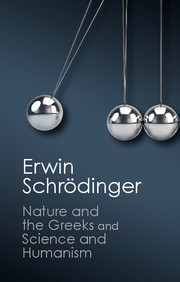Book contents
- Frontmatter
- Contents
- Foreword
- NATURE AND THE GREEKS
- SCIENCE AND HUMANISM
- Dedication
- Preface
- The spiritual bearing of science on life
- The practical achievements of science tending to obliterate its true import
- A radical change in our ideas of matter
- Form, not substance, the fundamental concept
- The nature of our ‘models’
- Continuous description and causality
- The intricacy of the continuum
- The makeshift of wave mechanics
- The alleged break-down of the barrier between subject and object
- Atoms or quanta-the counter-spell of old standing, to escape the intricacy of the continuum
- Would physical indeterminacy give free will a chance?
- The barto prediction, according to Niels Bohr
Form, not substance, the fundamental concept
Published online by Cambridge University Press: 05 October 2014
- Frontmatter
- Contents
- Foreword
- NATURE AND THE GREEKS
- SCIENCE AND HUMANISM
- Dedication
- Preface
- The spiritual bearing of science on life
- The practical achievements of science tending to obliterate its true import
- A radical change in our ideas of matter
- Form, not substance, the fundamental concept
- The nature of our ‘models’
- Continuous description and causality
- The intricacy of the continuum
- The makeshift of wave mechanics
- The alleged break-down of the barrier between subject and object
- Atoms or quanta-the counter-spell of old standing, to escape the intricacy of the continuum
- Would physical indeterminacy give free will a chance?
- The barto prediction, according to Niels Bohr
Summary
The situation is rather disconcerting. You will ask: What are these particles then, if they are not individuals? And you may point to another kind of gradual transition, namely that between an ultimate particle and a palpable body in our environment, to which we do attribute individual sameness. A number of particles constitute an atom. Several atoms go to compose a molecule. Molecules there are of various sizes, small ones and big ones, but without there being any limit beyond which we call it a big molecule. In fact there is no upper limit to the size of a molecule, it may contain hundreds of thousands of atoms. It may be a virus or a gene, visible under the microscope. Finally we may observe that any palpable object in our environment is composed of molecules, which are composed of atoms, which are composed of ultimate particles … and if the latter lack individuality, how does, say, my wrist-watch come by individuality? Where is the limit? How does individuality arise at all in objects composed of non-individuals?
It is useful to consider this question in some detail, for it will give us the clue to what a particle or an atom really is–what there is permanent in it in spite of its lack of individuality.
- Type
- Chapter
- Information
- 'Nature and the Greeks' and 'Science and Humanism' , pp. 122 - 125Publisher: Cambridge University PressPrint publication year: 2014

